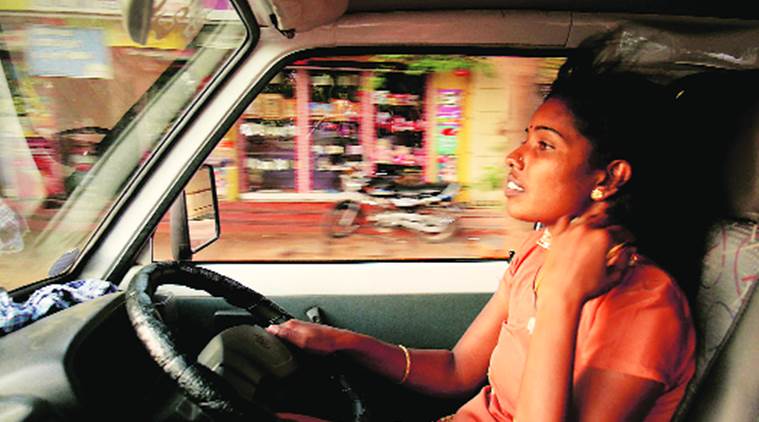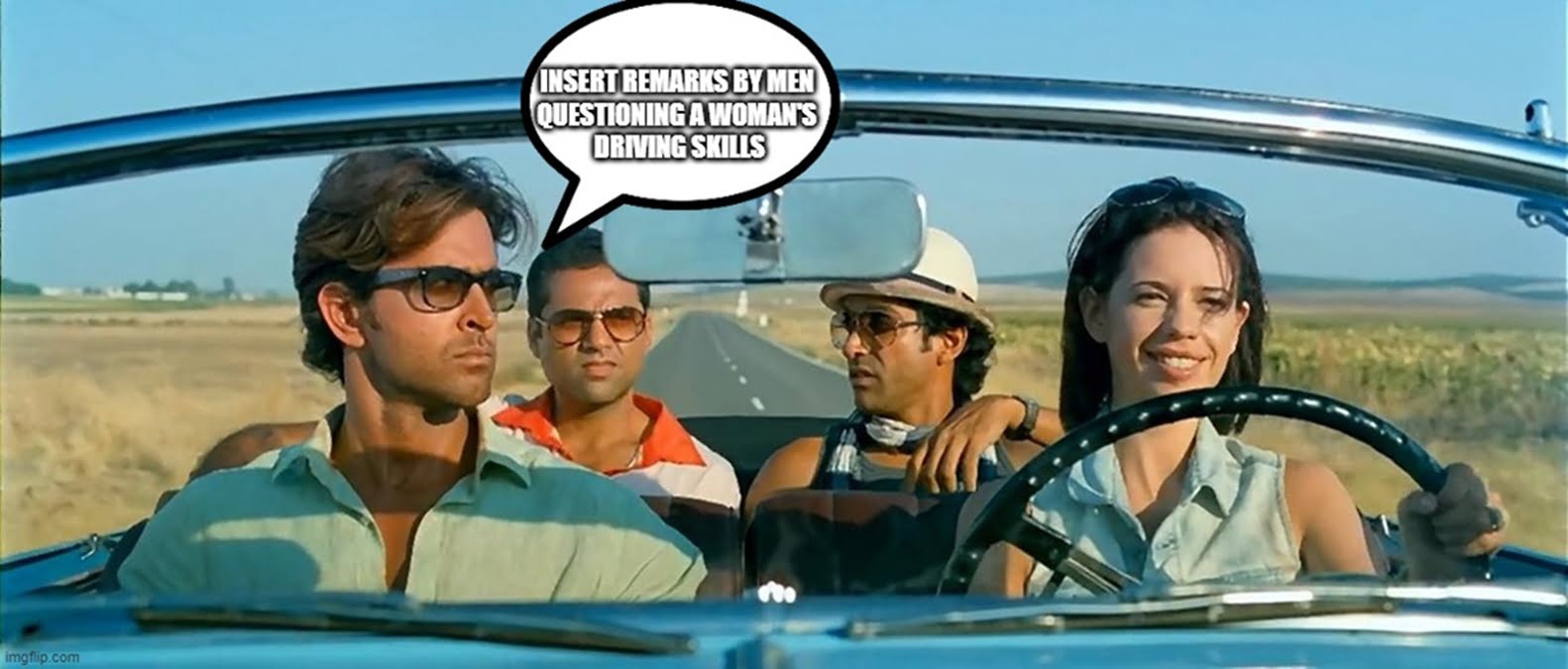My father drove so carefully and methodically that I thought my clumsy self would never be able to do it. Yet, I wanted to be emancipated from my pedestrian life, from crowded buses, and ladies-only compartments, and from my earphones that played odd music while I walked to places I had to go. My reasons to learn driving is rich with many feminist takes on taking the wheel, I don’t and never liked sitting in one place. I wanted to be liberated from the hopeless passivity of the passenger seat while men unwillingly drove me to places. But more than ever, I wanted the absurd company of small-town traffic, an escape from the solitude of walking alone to places I deeply cared about. Getting my driver’s license, despite the unappealing passport size picture of me on it, was pure bliss although it took me several attempts to accomplish one.
My first driving instructor was my dad. He took me on our family car, a white Swift with a very rusty gear shift, to an open plot of land that belonged to an old lady in town. The old lady was dead and she had no kids. All that was left of her was this piece of land where angry fathers gave daughters their first driving lesson. My dad kept pointing at all the three pedals, telling me what the clutch pedal does, something about disengaging or engaging a rotating shaft, something that I never understood. I felt like he was trying to teach me Math all over again. I panicked, accelerated the car, nearly missed a tree. He got furious, slammed the door at me, and left. Obviously, I did not do well on my first lesson.
Also read: Stop Teaching Women Only How To Cook; Teach Them Driving!
My second driving instructor was my grim-looking neighbor who ran a self-certified driving school. He taught all the girls in my town to drive, including the young nuns from our catholic convent who now confidently steer old chit-chatting women from their retirement homes to church and back. He came early every morning with his grim-looking car, picked me up from home, and let me drive on the empty road behind the airport. At first, I thought I was doing okay, and that I could actually do this in peace until my instructor started teasing me about how my body looked, and how I should look full and beautiful so that the town boys would want me. I would squirm in my seat hoping that it would swallow me whole and hide me under its fake leather. My desire to be small, invisible, and unheard during my lessons with him was exactly why I hate driving with men. I wanted to be left alone, with my own formulas and equations to figure out something that came so easy for other people. Instead, my instructor wanted to know if I had a boyfriend and if I had pre-marital sex.
My desire to be small, invisible, and unheard during my lessons with him was exactly why I hate driving with men. I wanted to be left alone, with my own formulas and equations to figure out something that came so easy for other people. Instead, my instructor wanted to know if I had a boyfriend and if I had pre-marital sex.
He told me I could confide in him because of his remarkable skill at secret-keeping. To show off, he told me a remarkably well-guarded secret of my aunty M. Aunty M was a married middle-aged woman with two kids. She was also one of my instructor’s successful students, who on the same day of receiving her license had driven off to see her lover for a celebratory beginning. He told me another story of teenager S, a former student of his who eloped with her high school boyfriend and filed a restraining order on her parents. The inhabitants of my town, including the likes of my instructor, feed on the private lives of women, taking away our stories and starring us in chai time infidelity gossip. Eloping this town just like S did with a lover of careless choice is probably the modern radical act I hope to commit someday. I denied having a boyfriend, about sex and everything my instructor kept prodding me about. Once I gave in and told him that I secretly smoke, a very non-women thing to do in town – hoping that this could be the compromise – a small secret that he could have of me.
On days that I menstruate were also the days he made a face at me. His eyebrows would perk up with disgust when I apologized for being late to class. I always needed an extra thirty minutes to slap on a sanitary pad while he honked his car outside my house. On one particular bleeding day, his eyes perked up an extra pair of disgust, “I have to go to the temple today, just don’t touch me, alright?”. I carefully drove to the temple, dropped him off at the gates, and waited outside while my sanitary pad turned heavy between my legs. Well, this is my chance. I had his car all to myself. I finally had the consolation of an empty passenger seat so I put his car into first gear. I drove down the narrow temple lane, turned a corner, and took a nice long drive before turning back to where I started. I was as joyful as a baby who suddenly figured out how to walk. I parked the car outside just where my instructor left it. When he came back from his shrine, his purity and scowl face restored, I knew that this would be the secret that he could never have of me.
My days of being alone in the car with my instructor were brought to a halt when my Neighbour N joined me on our morning trips. N was a nurse who worked at the local hospital. She used to travel to work on the only local bus that passed through town, which now has been discontinued due to COVID-19. “My husband works in the Gulf you know, I don’t really have much choice of transport now, other than the bus. Those idiots don’t run the bus in our street anymore, right?”, she would yell at my presence in the backseat. N has an old white ambassador gathering dust on her front porch. Sometimes her father-in-law would take it for a grocery run while she waits by the gate, one palm perched on her hip, hoping that this time the old man won’t forget onions. The car would wildly cough when he turns on the ignition, its rear end smelling brightly of tetanus fumes as the patriarch, snugly fit in his worn-down car seat, launch it forward in pursuit of onions. “Veeetil oru ambassador undu! Athennenkilum odichu jolikku ponnam” (translation: We have an Ambassador at home! I want to drive it to work someday), she tells me as she runs our scared little i-10 down a slope without applying any breaks at all. I, very pale-faced, tucking wildly on the seat belt that seem to have never found its use, reassure her that she would soon be able to drive to work. N drove my heart into many attack sort of scenarios. My blood would freeze as she refused to break at the wildest bends and curves, nearly scratching unsuspecting pedestrians and thoughtful pigeons, even then I was delighted to have her company on morning lessons, the simple company of another woman, whose presence had suddenly nullified my instructor’s unwarranted prowling.
Also read: 5 Indian Women In Motorsports Defying Sexist Assumptions
On the day of my driving test, my instructor left me at the testing ground with his wife’s pink helmet. I never owned a helmet because I never owned a scooter. I am still fearful of two-wheelers, especially after scratching my knee twice at University on random scooter runs. My helmet smelled like the hair of Malayalee woman, coconut oil, disgusting but also absurdly comforting. It reminded me of my grandmother who always had shiny silver hair, slick with virgin coconut oil she made herself and distributed to her friends. My four-wheeler test was smooth, it had to be. I had the extra training time my menstruation days allowed me. The two-wheeler was a nightmare. I drew an eight on the ground with the scooter that the supervising police inspector kept calling ‘meen vandi’ (old inexpensive scooters were widely used by fishermen to distribute fish among localities, and therefore the name meen vandi became associated with it; meen – fish, vandi – vehicle). He would yell at me, watching and scribbling on his notepad, as I luckily swerve every iron rod picked on the ground,
“Meen vandi vallaku (turn)”
“Meen vandi thiriku (another word for turn)”

Do vehicles have our occupation, gender, and caste tied to them too? Can you scan my vandi and tell me who I am, where I come from? Can you guess my age and the size of my house from where I park it? Does everyone who sell fish have to ride cheap scooters?
I remembered a passage from I Know Why the Caged Bird Sings, where the fifteen-year-old Marguerite Johnson drove her drunken snoring father in the backseat of his Hudson, away from the bar down the mountainside toward Calexico. Maya Angelou writes with conviction, “Idiots and lunatics drove cars, why not the brilliant Marguerite Johnson?”.
I made a big fuss when the postman brought the envelope that had my license. My first (second) time driving unassisted was to pick up my brother from college. With an orderliness found only in funerals, I punched the right knobs, turned and twisted, and pulled until I could neatly drive past my watching neighborhood. I remembered a passage from I Know Why the Caged Bird Sings, where the fifteen-year-old Marguerite Johnson drove her drunken snoring father in the backseat of his Hudson, away from the bar down the mountainside toward Calexico. Maya Angelou writes with conviction, “Idiots and lunatics drove cars, why not the brilliant Marguerite Johnson?”. Instead of a lump of snoring unhelpful mass that was Marguerite’s father, I had my brother, whom I cared for and took care of by my side, on the passenger seat. To be able to make his life a bit better by driving him to college was what I wanted all along. He would sit unalarmed, quietly swiping on his phone, annoyed with only the sun that glared his screen, as if I had always driven him to places he deeply cared about, just like our father used to.
About the author(s)
Sharon is a staff writer for FII.




